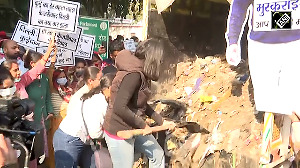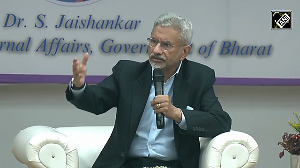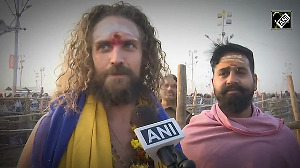The 17th Party Congress opened today at Beijing. Held once in five years, such a Congress is a trend-setting and over-arching policy-making event that affects almost every aspect of China. Nearly 1,000 reporters have converged at Beijing to transmit to the outside world about major decisions of the congress which include electing a new central Committee and a new standing committee of the Politburo, the top-most decision-making body in China for the last more than five decades.
Unlike the previous congresses till about the 1980s, more and more of the events related to these congresses, jockeying for power by several political factions, possible policy implications and the like are becoming predictable in the recent period. Although the Chinese Communist Party still retains its Leninist organisational character, due to reform efforts of opening up the country, gradual implementation of transparency is visible in several facets of Chinese life today.
In the run-up to the congress and during the congress, several changes are likely to be made to the work report to be submitted by the General Secretary of the CCP, Hu Jintao, reflecting to the aspirations, themes and pressures of different constituents of China today.
Preparations for this congress were kicked off with a preparatory committee making arrangements for election of delegates to the congress from various parts of the country. The process is complicated but different from what we witness in India or other countries in that the CCP leaders fan out to 'electoral blocks' in work groups and canvass for the designate candidates. Thus, election of these delegates was completed between October 2006 and June 2007.
Interestingly, over a period of time, the number of electoral blocks, delegates, their composition, etc underwent gradual changes. For instance, while 36 institutional electoral blocks elected delegates to the 15th Party Congress in 1997, their number rose to 38 blocks in the 16th Party Congress held in 2002. These blocks include provinces, trade union congress, women's federation, Communist Youth League, military, etc. Overall, at the national level, by August 2, 2007, more than 73 million CCP cadres elected 2,217 delegates to the 17th Party Congress that began today. In comparison, the 15th Party Congress had 2,048 delegates elected by 58 million CCP cadres in 1997 and the 16th Party Congress 2,114 elected by 66 million CCP members in 2002.
What India needs to take note of is that relatively younger and educationally qualified candidates are getting elected to the congress over a period of time. Composition-wise, among the delegates elected to the 17th Party Congress, 28.4 percent are said to be grass-root cadres of the CCP; women delegates accounted for 445 or 63 more than at the 16th Congress, accounting for 20.1 percent; delegates belonging to ethnic minorities constituted 242, ie, 12 people compared to 16th Congress, making up 10.9 percent.
In addition, middle-aged and younger delegates constituted 1,561 delegates under age 55, comprising 70.4 percent which is 7.2 percent higher than the ratio of those attending the previous congress and 416 delegates are under age 45, or 0.8 percent higher than the proportion of the delegates of the same age group at the previous congress. In terms of educational qualifications, this report indicated that 93.3 percent of delegates are at or above the junior education level which represent 1.6 percent higher than previous congress figures.
Another significant feature is the changing social composition of the CCP. Today thousands of private entrepreneurs have joined the CCP, while professionals as well try their luck in the whirlpool of Chinese politics. This was termed as the emergence of the 'new social stratum' in China. Referred to by former President Jiang Zemin in 2001 at the 80th anniversary of the CCP, this section came into being triggered by the reform programme initiated in 1978. Members of this stratum include technicians, private entrepreneurs, managers, engineers in foreign invested JVs, self-employed and professionals. Thus the social base of the CCP moved away from 'gong-nong-bing' [workers- peasants-soldiers] formula of the Maoist era towards this 'new social stratum' of 50 million professionals (whose assets total more than $1.3 trillion), private entrepreneurs, etc. Some of these were co-opted by the CCP to become ministers such as the current health minister Chen Zhu. It needs to be noted that these were either given party membership or co-opted through the United Front Work Department of the CCP Central Committee, which conducts 'theoretical research classes' for these professionals.
However, not all these 2,217 delegates would be attending the Congress from today, as three died due to illness, while one was suspended following 'serious violation of discipline'. Also, 57 specially invited delegates, with equal rights, will attend the congress. These include former CCP leaders President Jiang Zemin, Premiers Li Peng, Zhu Rongji and others who held sensitive positions before.
Just before the congress opened today, several other sessions and political maneuvers indicated to the possible policy and composition of this congress. The 7th plenary session of the previous 16th Party Congress was held at Beijing on October 9-14. It considered the draft report to be submitted to the 17th Congress. It decided to amend the party constitution to include 'scientific outlook on development' and 'social harmony'. These two are crucial as these become the 'guiding' theory for the party and parroted out in the next several decades.
'Scientific outlook on development' has become crucial in the last few years due to several reasons. Foremost, CCP leaders have identified specific terms as their legacies to posterity. Thus Deng Xiaoping pushed through 'socialism with Chinese characteristics' in the 14th Party Constitution in 1992 and 'Deng Xiaoping theory' in the 15th Party Congress in 1997, while Jiang Zemin enshrined 'three represents' in the 16th Party Congress in2002. The concept of 'scientific outlook on development' now is seen as anointing Hu Jintao's position, specifically as his term would come to an end by the 18th Party Congress in 2012. More concretely, the concept underlines the need to carefully evaluate the current problems of China (such as regional and income inequalities, rampant corruption, social unrest, etc).
Secondly, the ascendancy of Communist Youth League in the CCP hierarchy and its insistence on relatively more conservative approach towards such phenomena like Falun Gong, discourse on 'spiritual civilisation' initiated by Jiang Zemin in the 1990s and the general rise in neo-Confucianism in the country. With the decline of communism as an ideology in China from the late 1970s, the Chinese leaders like Deng Xiaoping and more pronouncedly Jiang Zemin promoted neo-Confucianism alongside rampant consumerism. The current leadership is aware that one of the factors for the decline of Qing Dynasty and its inability to counter Western powers in the 19th century was due to the spread of neo-Confucianism that hardly allowed for any innovation or development. Also, Falun Gong claims nearly 200 million members across China and with membership traced to the influential CCP cadres. Nor surprisingly, last few weeks saw officials critiquing Buddhist rituals in China.
The concept of 'social harmony' introduced first at a party plenary session on October 11, 2006, is also seen as pointing towards Hu Jintao's legacy for the near future. Hu inherited the mantle as social unrest spread like rapid fire. 87,000 protests were reported in 2005, while this figure shot to 120,000 in 2006. Interestingly, more than 50 percent of these protests are against lock-stock-barrel privatisation programme implemented by the CCP as a part of 'to become rich is glorious'. Increasing protests and the increase in the number of people participating in such protests have galloped leading to prospects for questioning the legitimacy of the CCP. Also unrest in Tibet, Xinjiang and Inner Mongolia increased over a period of time. The Chinese consider the security situation in Tibet as 'grim' and the call of the Dalai Lama to observe ban of animal skins as a complete success and indicated to his grip over the Tibetans in Tibet.
Another aspect of this Congress is the plan to introduce 'inner-party democracy'. According to Li Junru, vice-president of the Central Party School who had participated in the drafting of the 16th Party Congress report and likely to have been drafted for the 17th Party Congress work, argued that congress should emphasise on reforming inner-party's electoral system, policy-making mechanism, supervisory system, and experiment on a permanent party congress system in cities in counties.
One of the most interesting aspects of the CCP Congresses that has attracted global attention has been the changes in the personnel. Indeed, each of the Party Congresses before indicated that the personnel in decision-making bodies would be changed depending on the qualifications, age factor or even based on 'guanxi' [connections]. The 17th Party Congress, likewise, could witness changes in the personnel to the Central Committee, Political Bureau, Standing Committee and central military commission. It is here that different factional struggles take place with each jockeying for their candidates, and surely Hu Jintao and Jiang Zemin would be vying for their candidates' elections to crucial party posts.
Srikanth Kondapalli is Associate Professor in Chinese Studies, JNU






 © 2025
© 2025